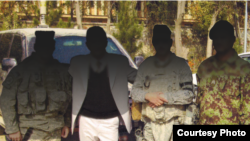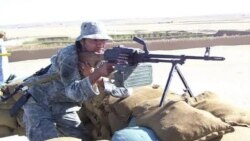Day and night, amid the relentless din of interstate traffic, Aimal tries to take solace in this nondescript low-income housing unit alongside the Baltimore-Washington Parkway.
The spartan flat holds all his worldly possessions: a wooden coffee table, a couch, a lamp, a yellow manila envelope bulging with vestiges of a prior life.
The former war zone interpreter is among an estimated 15,000 Afghans who risked their lives and endangered their families to guide U.S. forces through their longest-ever conflict. While Aimal’s five years of service exposed him to Taliban militants’ death threats, marked all his relatives as traitors and frightened him into locking himself in his Kabul home for months, it also earned him a prized U.S. visa.
He used to consider himself one of the lucky ones, but a year after arriving stateside, the prospect of a better life remains frustratingly elusive. He’s been homeless and jobless, his prestigious university degree meaningless to American employers.
"My family in Afghanistan treats me like I’m a failure because I don’t send any money back and I’m on public assistance," said Aimal, appearing older than his 30 years.
"I would rather die in Afghanistan with my pride intact than live here in poverty and shame," he said. "At least in Afghanistan, the grave is free. Here, they make you pay for it."
Complicated path to America
Between overlapping wars in Iraq and Afghanistan, U.S. forces employed an estimated 50,000 Iraqi and Afghan linguists, some of whom were made eligible for resettlement via the Special Immigrant Visa (SIV) program.
Launched in 2009, the Afghan SIV program was designed to allocate 1,500 visas annually. In 2011 it issued three; by late 2012, 32 had been granted among 5,700 applicants.
As various news outlets reported, most translators found themselves mired in an expensive, Byzantine application process. Paperwork stalled amid intra-agency gridlock, leaving them in a dangerous logistical limbo. Faced with death threats, visa uncertainties and the steady drawdown of U.S. security personnel, they could neither plan for new lives nor return to ones they knew.
Some established preliminary eligibility only to see it expire amid the bureaucratic deadlock. Some held out hope for years only to be rejected. At least four were killed by Taliban insurgents while awaiting a decision, according to independent confirmation by five sources. One of them is Mohammad Kazim Noori, who manages the U.S.-based Afghan SIV Applicant Association, whose Facebook page has nearly 11,300 members. Beyond the five primary sources, three members of Noori’s online community provided names, dates and locations in which SIV applicants were killed.
“I have received messages from my page members who have said their family members were kidnapped and killed because of their employment with U.S. army and their cases are still under process,” says Noori, an SIV holder now living in Kentucky. “There were some interpreters who were killed while their SIV applications were under so-called ‘administrative processing.’”
Despite Secretary of State John Kerry's 2014 order to streamline the application process — about 9,000 of the visas have been issued since he took office in February 2013 — some observers feared the program would die with last December’s planned withdrawal of combat troops.
But on December 31, Congress passed legislation to continue relocating the Afghan translators. Directed to tackle the enormous backlog, State Department officials were authorized to issue an additional 4,000 visas through 2016. As of late March, some 13,000 applicants remained in the queue, one official said.
Night letters
Unpacking the manila envelope, Aimal sees his old life come back into focus.
A Kabul University diploma, a crisp blue passport bound on the right side, a photo of Aimal posing stiffly alongside high-level U.S. military brass. His language proficiencies garnered numerous accolades: letters of recommendation from a U.S. Army captain; official recognition, signed by a colonel, for invaluable contributions to an Afghan military base development.
With his first anniversary on U.S. soil came another official document: his second eviction notice in less than three months.
For Aimal, passage to America started the same way it does for most translators: with a series of harassing, anonymous phone messages — the Taliban's modern day “night letters.”
"Come out," Aimal recalls a stranger’s voice saying in Pashto, as he feverishly tried to pick up on telltale background noises, wondering if the caller was right outside his home.
"I said, 'What are you talking about? You got the wrong person.'" But the caller brought him up short: "Oh, we know who you are, Aimal. We know your badge number. We know what type of clothes you're wearing. We know your shoe size. We know who you are working for.'"
Terrified, Aimal quit his job to seclude himself in the house, knowing his mere presence might imperil his wife, siblings and parents.
Occasionally venturing outside, he became paranoid at the sight of long-familiar faces. His neighbors must have been reporting to the enemy, he remembers thinking. How else would the Taliban know about his job? "I don't have a label on my forehead that says I'm working with the U.S. government."
Aimal pleaded with family members to depart for Pakistan, but they refused. So, in December 2012, he initiated his SIV application.
Fearing for his wife, Shekiba, he told her to stop visiting family, to “think or suppose that you are a prisoner in your own home.”
“Stay here, have patience,” he told her. “God is kind. One day we will get our visa.”
‘In D.C. streets’
After nearly a year of inquiries to the American embassy, Aimal learned the vetting process had slowed so much that portions of the application lapsed. Data from the couple’s medical examinations “expired after nine months,” he says. "They said we had to redo the tests."
At the time, U.S. officials recognized only one Afghan medical clinic, which charged $500 per person for basic communicable-disease testing, a minor fee in addition to the $2,800 required for a full medical checkup and $1,000 for vaccines. In the corruption-rife country, administrative processing of $100 passports and $80 notarized marriage certificates can take months. Unwilling to remain locked in his home indefinitely, Aimal paid someone $2,000 for 48-hour delivery of the vital documents.
The couple rotated through relatives’ homes until their visas arrived in March 2014, but their reprieve from anxiety was short-lived. Along with the prized documents came notification their U.S.-bound flight, organized by the International Organization of Migration, wouldn’t depart for three to six months.
In view of the continuing Taliban threat, they purchased a pair of one-way, $1,425 tickets to Washington, exhausting their savings. So Aimal borrowed money from relatives and Shekiba pawned most of her jewelry, giving them $515 to start their new lives. They spent their first week in the U.S. with Aimal’s American adviser. Unwilling to crowd his small Washington apartment longer, they quickly turned to acquaintances in Virginia, then shuttled among any who would take them.
Days turned to weeks. Thinking their troubles would be short-lived — that perhaps this kind of hardship was simply what getting established in the West entails — they restricted spending to rides on public transit, frequently eating at soup kitchens.
"We were homeless for two months," he says, adding that leasing office visits only compounded the stress. "I didn’t know D.C. was this expensive: $1,500 a month, $2,600 for a full apartment…. That was the first time in my adult life that I really cried," he says. “In D.C. streets."
Not the ’79 diaspora
For Virginia-based Afghan war veteran Matt Zeller, Aimal’s story is shamefully common.
"We found Aimal living homeless in Dupont Circle last April," says Zeller, a former U.S. Army captain and combat adviser who has helped get numerous interpreters off the streets. Aimal, still uprooted, had been told to meet him in the small downtown Washington park. Zeller said he "got him hooked up with the International Rescue Committee, because, quite frankly, they're just much better attuned to finding these guys housing."
Zeller was embedded with Afghan security forces when his convoy came under attack by Taliban fighters in 2008. Hurt and low on ammunition, he was lying in a ditch when an Afghan linguist named Janis Shinwari, who was also trained to use firearms, came to his rescue.
"Somebody landed next to me and then I heard the unmistakable sound of an AK-47 being shot right next to my head," Zeller told VOA in a November 2013 Afghan service interview. "I turned, and he’s shooting dead these two Taliban fighters who had rounded the corner of a building. Had he not been covering my back, I wouldn’t be sitting here."
Like Aimal, Shinwari experienced setbacks, detours and dead-ends applying for his visa, forging passage to the United States only after Zeller crusaded on his behalf.
Zeller’s mission expanded when the story of Shinwari’s 2013 arrival on U.S. soil went viral, triggering a crowdfunding campaign that generated $35,000 for his family. Shinwari asked Zeller to use the funds to launch No One Left Behind, an organization dedicated to bringing battlefield allies stateside after their service, also providing housing and job assistance.
But for young Afghans like Aimal, Zeller says, getting a roof over their heads is only the first in a series of daunting tasks unique to integrating with post-9/11 America.
"It’s not like the '79 diaspora," he says, referring to the last large wave of Afghan immigrants to arrive.
Many of those Afghans, fleeing the Soviet invasion, were part of a wealthy, landed elite that possessed the financial means to get started in a new country — one where an abundance of middle-class assembly-line jobs were the norm.
"Those jobs don't exist anymore, and the ability to plug these people into our economy has not happened," says Zeller.
From affordable rent to fair-wage jobs, problems central to the plight of America’s working poor — with its own cohort of struggling veterans — also burden this generation of Afghans. Despite their English-language proficiency, they face abysmal odds of finding even entry-level labor.
Systemic resettlement shortfalls
As Zeller tells it, problems begin before translators even board a U.S.-bound flight.
Departing Afghanistan, SIV holders meet with U.S. embassy personnel about their options. They can go it alone or choose a federal resettlement package: 90 days of aid from the State Department or eight months courtesy of the U.S. Department of Health and Human Services’ Office of Refugee Resettlement. Both packages provide a flight, furnished housing and career counseling.
But the manner in which embassy staffers present the programs, Zeller believes, skews expectations, leading "these guys to think they’re entitled to everything."
What they are not told is that the HHS-administered program, the choice of most interpreters, entrusts their resettlement to one of nine subcontracting social service charities that receive no direct federal supervision beyond mandatory IRS filings.
Because neither the State Department nor HHS tracks resettlement case resolution beyond their respective program calendars, success rates aren’t clear.
"All SIVs enrolled in the State Department’s reception and placement program have case reports completed at 90 days after arrival, documenting provision of services and participation in various benefit programs," said Christine Getzler Vaughan, spokeswoman for the agency’s Bureau of Population, Refugees and Migration. "From time to time we learn of SIV holders who are having difficulty in finding employment. Resettlement agencies at the local level and other social service agencies often help with additional counseling beyond the eight-month service period, and SIVs continue to be eligible for social service support according to the programs in their state of residency."
Afghan SIVs currently reside in 47 states. Regardless of where they land, their botched resettlements imperil national security.
"America is going to have to go to war again someday, and there is nothing more important than the ability to follow through on our word," U.S. Representative Adam Kinzinger, an Illinois Republican, told The Washington Post in 2014. The former Air Force pilot who served in Afghanistan co-sponsored the 2014 bipartisan bid to extend the SIV program.
Housing
U.S. resettlement programs such as those run by the International Rescue Committee are mandated to provide furnished rental units, but "some of the U.S. military’s top Afghan allies have been placed in empty, rodent-and-bedbug-infested apartments" in a high-crime complex, The Washington Free Beacon recently reported.
In Maryland, the IRC reliably provides $700 toward first month’s rent and $559 for each of the following seven. According to Aimal and Zeller, the group has withheld “welcome money,” the federally subsidized stipend of $1,800 designed to help clients cover incidental expenses until their temporary food stamps and Medicare benefits kick in.
But IRC official Lucy Carrigan says SIVs who traveled independently to the U.S. prior to June 2014 were not eligible for the grant. While the State Department has since modified that practice, to make all incoming SIVs eligible for welcome money, she says specific challenges remain.
"Afghans come to the United States with specific expectations as to how life will be for them when they arrive," Carrigan said, explaining that they typically receive minimal cultural orientation. "While we do the best we can with the funding we have, the reality they face does not always match those expectations."
Employment
New arrivals have to find jobs quickly. Indeed, SIV program guidelines require visa holders to accept the first job offer they receive. But even for college-educated Afghans such as Aimal, a specialist who consulted civil engineers in Kabul on behalf of the U.S. Army Corps of Engineers for $3,300 a month, landing a paycheck is difficult.
For the majority of battlefield interpreters who were lucky to top $700 a month in Afghanistan, even a minimum-wage job would be an adequate starting point.
"I've taken these people to Harris Teeter [supermarket], Target, Wal-Mart, you name it … places they should be able to walk in, no problem, and get a basic entry-level service industry job," says Zeller. "To a person, not a single one gets hired."
The reason, he says, is the technological divide that still separates their world from the West, even long after they’ve arrived. With most job searches conducted online, training translators to digitize their résumés does nothing to undercut systemic biases programmed into the conventional Western data infrastructure.
In online templates, they face "dropdown menus for prior jobs, all schools attended, etc.," he says, explaining that most Afghan institutions aren’t listed in the database. Such candidate profiles are difficult and costly to verify, especially when the jobseeker’s professional background is possibly classified and their personal credit and rental histories don’t exist.
"They don't have any verifiable information," says Zeller. "They're not coming from Western Europe or Japan or Brazil or Australia. They are not coming from stories we get and understand."
Aimal got a job offer from a northern Maryland juice factory – and accepted it even after learning that he’d no longer qualify for $300 a month in food stamps. Public transit services didn’t open early enough to get him to the job site on time, so he had to pay drivers for rides each way. Twenty-six days of employment left him financially worse off than unemployment, forcing him to quit.
He considered a more practical option: returning to Kabul.
In their footsteps
He wouldn’t be the first SIV-holder to make the return trip.
State Department officials don’t track how many SIV holders bounce back to Afghanistan, but Aimal, Zeller and Noori of the SIV Applicant Association say multiple translators have already given up on American life, opting instead for one of the most dangerous corners of the globe.
One translator’s family returned to Kabul last summer, after being forcibly evicted by the very landlord now threatening to expel Aimal. Realizing the gravity of his mistake, the father of two called Zeller in August to say that he was still being hunted, that he was desperate to get his wife and kids back on U.S. soil.
Zeller’s Afghanistan contacts have since been unable to locate the family.
Despite the real threat of death in Afghanistan, for many translators it is also, in a stoically pragmatic kind of way, a less horrid scenario than struggling amid uncertainties of U.S. life. Better to die at the hands of Taliban extremists than on American soil, where language barriers and burial costs could devastate a Dari- or Pashto-speaking spouse.
The specter of death and debt
The grim cost-benefit analysis has begun to consume Aimal. Stubbing out a cigarette with his boot as a fire engine roars down the adjacent parkway, he relays one notable stroke of fortune: a part-time security guard job at $11 per hour.
In another stroke of luck, someone anonymously gifted him the rusty 2001 Honda Civic parked just across the mulched commons. But five months into the new job, the hours have proven so inconsistent that he’s twice fallen behind on rent.
His second eviction notice, dated March 24, coincided with news that the night letters have resumed, this time targeting his father-in-law and brother.
Late one night last month in Kabul a restricted number flashed on his brother’s phone.
"Tell Aimal it’s time for a visit," the caller whispered in Pashto.
His brother snapped the phone shut. But it rang again.
"Tell him mother is sick," the caller said. "Or maybe something very bad happened to father-in-law. Tell him and make him come, or we’ll come to take you."
Aimal is confident his brother, who once was listed as an employee on the interpreter’s contract with U.S. forces, can qualify for resettlement under SIV guidelines. He’s more concerned for his elderly father-in-law, whom he’d hoped to bring to the United States as a visitor. Unable to satisfy State Department requirements that a household of Aimal’s size have at least $10,000 in a bank account for three consecutive months, he gave up, leaving his in-law on the run.
Because he can’t even guarantee his $885 rent, his thoughts constantly return to Kabul.
"My name, my bank account number, my photos, my email, it's all on a Taliban watch-list," Aimal says, pulling another smoke from the pack.
"This Taliban..." he says, flicking a smoldering match to the damp ground. "They’re like an insect. Everywhere, like bedbugs. And my father-in-law, the doctors say his heart … the vein..."
Aimal’s voice trails off. He's thinking. He's not thinking. He's attempting to coax a narrative through the chronic hangover of sleep deprivation.
"I put everybody's lives in danger. My family. Her family," he says, gesturing toward the darkened living room where Shekiba waits behind lowered blinds. "I'm really proud. I'll never regret that I worked with the U.S. government. I’m happy that I worked for them. I support the U.S. government. I support my government."
Playing on the Afghan ethos of sacred family bonds, the militants are forcing Aimal to the brink of an impossible decision: gamble with waiting out another round of visa processing or take the militants at their word that, by returning home, they will spare his brother’s life and take only his instead.
"I know that they can kill my father-in-law and my brother," he says in a halting staccato, as if uttering the words requires unusual effort. "My concern is that if they take them hostage, I have to go back and surrender myself. I don’t have any other option."









